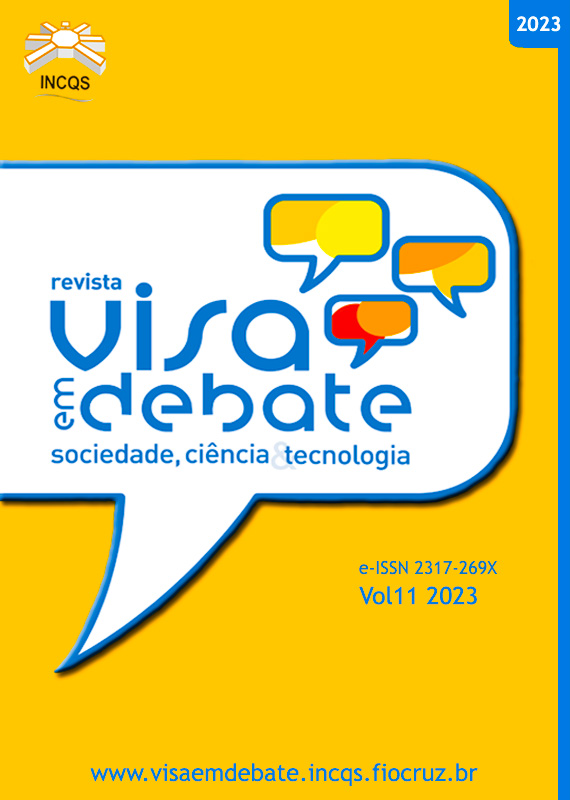Epidemiological profile of severe acute respiratory syndrome cases in the state of Minas Gerais, Brazil, 2020 to 2021
Vigil Sanit Debate, Rio de Janeiro, 2023, v.11: e02062 | Published on: 03/08/2023
DOI:
https://doi.org/10.22239/2317-269x.02062Keywords:
SRAG, COVID-19, Descriptive Epidemiology, Infectious Diseases Reporting, SARS-CoV-2Abstract
Introduction: The increase in the number of cases of severe acute respiratory syndrome (SARS) associated with Sars-CoV-2 has given rise to one of the largest public health emergencies in the world. Objective: To evaluate the epidemiological profile of SARS in the state of Minas Gerais, from 2020 to 2021. Method: A cross-sectional, descriptive,
retrospective, and qualitative-quantitative research was carried out. Data were collected from the SIVEP-Gripe system and the COVID-19 Case Monitoring Panel, for the years from 2020 to 2021. The variables analyzed were: total COVID-19 cases, total SARS and SARS due to COVID-19, age, sex, race, final classification and final evolution. Results: The state had 315,726 SARS cases, and of these, 58.6% were caused by Sars-CoV-2. Most individuals who presented SARS were male, aged 60 years and over and brown. Among the SARS cases, 23.3% evolved to death, and of these, 77.6% were caused by COVID-19. The regions of Uberlândia, Belo Horizonte, Coronel Fabriciano, Patos de Minas, Uberaba, Ituiutaba, Leopoldina, Governador Valadares and Juiz de Fora had the highest occurrences of SARS/inhabitants. The regionals from São João del-Rei, Teófilo Otoni, Passos and Uberaba stood out for having a high lethality rate of patients who had SARS due to COVID-19. Conclusion: The distribution of reported SARS cases and deaths in Minas Gerais was heterogeneous, with a greater number of cases in municipalities with higher population density. The questions listed in this research pointed out the deficiencies and weaknesses in the response capacities to face the pandemic, which indicates the need for decentralizing and restructuring the health system of several municipalities in the state.
Downloads
Downloads
Published
Issue
Section
License
Copyright (c) 2023 Luiz Fernando Moura Goulart, Luciano Ricardo de Oliveira, Leonice Domingos dos Santos Cintra Lima, Luciana Estevam Simonato, Danila Fernanda Rodrigues Frias (Autor)

This work is licensed under a Creative Commons Attribution 4.0 International License.
COPYRIGHT ALLOWANCE The author (s) hereinafter designated as the ASSIGNOR hereby assign and transfer, free of charge, the ownership of the copyrights related to this ARTICLE to the Vigilância Sanitária em Debate: Sociedade, Ciência & Tecnologia (Health Surveillance under Debate: Society, Science & Technology) – Visa em Debate, represented by FUNDAÇÃO OSWALDO CRUZ, established at Av. Brasil, nº 4365, Manguinhos, Rio de Janeiro, RJ, Brazil, CEP 21045-900, under the conditions set out below: (a) The terms and conditions set forth in this Agreement shall apply to the following: 1. The ASSIGNOR declares that they s(he) is (are) the author (s) and owner (s) of the copyrighted property of the ARTICLE submitted. 2. The ASSIGNOR declares that the ARTICLE does not infringe the copyrights and / or other property rights of third parties, that the disclosure of images (if any) has been authorized and that they s(he) assume(s) full moral and / or property liability for its content, before third parties. 3. THE ASSIGNOR assigns and transfers all copyrights relating to the ARTICLE to the ASSIGNEE, especially the rights of editing, publication, translation into another language and reproduction by any process or technique. The ASSIGNEE becomes the exclusive owner of the rights related to the ARTICLE, and any reproduction, totally or partially, is prohibited in any other means of publicity, printed or electronic, without prior written authorization from the ASSIGNEE. 4. The assignment is free and, therefore, there will be no remuneration for the use of the ARTICLE by the ASSIGNEE.







